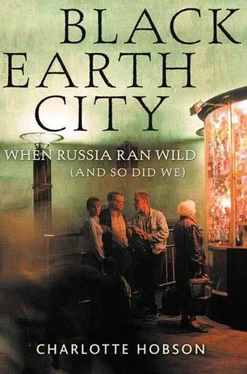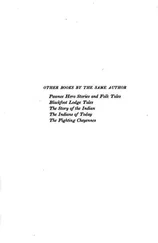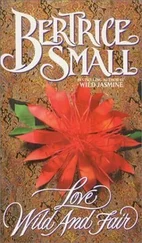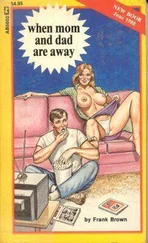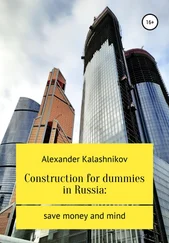“ S prazdnikom ,” we greeted each other. Yakov passed out the carnations, three for each of the girls. “Nina’s making blini,” reported Tanya, taking the flowers for both of them and putting them on the table without much evidence of gratitude. “They’ll be ready soon, so stick around.”
“I certainly will,” said Yakov, squeezing in between Liza Minnelli and Katya and draping an arm around each of them. He was in fine spirits.
Nina opened the door with one foot, talking over her shoulder. “Tell Yuri too,” she called. “Here, golubki , my doves,” she said, advancing with a full frying pan. “Take, eat these blinis, in celebration of being women.”
“You too, Yakov,” added Liza, giving him a look from under her eyelashes that could have fried pancakes. Katya giggled nervously.
Yuri and Emily arrived and we covered blinis with thick sour cream and red caviar and drank champagne, as families did all over Voronezh. Sometimes poverty is hard to measure.
After a bit Tanya started telling us about the affairs she’d had with mafiosi when she was working as a secretary in the police department of her hometown, and about the six parrots in her parents’ apartment who were all called Gosha. Liza Minnelli put on some music and began to dance Liza Minnelli—style, still looking at Yakov, and then he told her she was tense, and took her over to the window and made her visualize a path through a sweet-scented forest with a little breeze… Tanya told some story about going to the forest with Yakov that I can’t remember, but that sent Emily into a fit of silent, breathless laughter, which, as always, made the rest of us laugh. And Katya sat on the bed saying nothing.
“Have some champagne,” Yuri offered. But she refused.
“Oh, give it to me,” Tanya demanded. “I’ve known Katya for years, she’s happy just to sit there like a cabbage.”
Katya bit her lip. “I can’t drink,” she said quaveringly, “as Yakov knows very well. I’m having a baby.”
There was a pause. “We haven’t decided that,” said Yakov, leaving Liza Minnelli by the window.
“What’s to decide? I’m not having an abortion.”
Liza Minnelli glared at them both. “You’re pathetic,” she spat, and walked out.
“Well—” said Yuri into the silence. “Let’s drink to the baby. Congratulations.”
The next time I saw Katya was at the Easter service, a few weeks later. Mitya refused to come; the new religious freedoms had not changed the fact that he, like most Russians, was an atheist. The church, however, was crowded with people of all ages: from the babushkas in black who had worshiped here for decades to the young women half hidden behind scarves, recent and passionate converts. The majority, however, were there just for Easter, which promised to be a spectacle. At midnight would come the great awakening; until then the priests were still in mourning black, the candles were extinguished, the iconostasis gleamed modestly through the murky light. The crowd jostled and shifted with excitement. Everyone had dressed up and bought candles for the service; at home a feast awaited them, with twelve toasts and the kulich , a cake of sweet cream cheese the shape of a sand castle.
“I’d like to be baptized,” Katya said. “Just so that I can cross myself, you understand. I can’t even cross myself if I see something nasty. I think it would be good for the baby, don’t you?”
“Aren’t you nervous about having a baby?”
“A little,” she confessed, frowning. “But my mother’s going to help. We’re going to live with her at the beginning.”
At a quarter to midnight, the priests disappeared behind the iconostasis and reappeared almost immediately in golden robes stiff with embroidery. The bishop of Voronezh stepped out in front, his strong old face thrust forward purposefully. He lit the candles of the few people close to the altar, and in a cloud of incense, followed by his priests, he led the procession once around the interior of the church. The excitement was building. The flame from the bishop’s candle had by now spread from hand to hand back through the crowd; three hundred faces, lit from beneath, glowed and shone in the sudden heat. Those at the front were able to follow the priests, but where we were the crowd heaved and buckled, and twice I watched, unable to move, as a candle passed too close to a tangle of hair. Katya looked over her shoulder at me desperately.
“Help,” she whispered. She was being crushed from one side; she’d almost lost her footing. I grabbed her arm and pulled her back beside me. We grinned at each other, relieved.
The doors of the church were flung open. We passed through them and began to circle the church. Once, twice, three times. Hundreds of feet shuffled through the slush and pushed it back until the earth was revealed. Night air, the deep, slow voices of the choir and the rattling censer. At last we gathered in front of the doors, where the bishop stood silent, surrounded by priests. The babushka beside me was weeping into her scarf.
Raising his arms in an embrace, the bishop cried out: “Christ is risen!”
And the crowd answered in a shout: He is risen indeed.
The bells jangled. The doors of the church opened and inside the light was unbearably bright.
Katya and I left soon after midnight, although the service would continue until morning. As we hugged good-bye, I promised to visit her soon, to see if there was anything I could do to help. Now that there was less of a crowd, I could see she had lost weight. Her brown spaniel’s eyes welling with emotion in her pale little face made me shiver. A less motherly figure would be hard to imagine.
As it happened , I was the one who needed help. A couple of days later, Mitya, Yakov, and I were on a trolleybus trundling along the left bank, going to visit friends, when my head began to spin and everything went black. When I regained consciousness, they’d got me off the bus and were carrying me toward a small wooden house painted green and blue and covered in snow. Katya appeared in the door, eyes wide.
“She fainted,” Mitya explained. “Can she lie down?”
“Oh,” Katya said, looking over her shoulder. “Mama!”
I leaned against the door frame and began to slide gently toward the floor. Mitya caught me under the elbow.
“What have you done to her?” Katya’s mother demanded. “Poor girl.”
Mitya went white. “Nothing—”
“Bring her in, quick!”
I was aware, suddenly, of lying down on a couch. “Just not eaten,” I tried to explain. My tongue felt swollen. “Nothing…”
“Off you go, boys,” Katya’s mother interrupted. “Shoo!”
Mitya and Yakov were bundled out of the house.
“Nothing serious,” I finished to an empty room, and fell asleep.
In the darkness, I jolted awake and couldn’t think where I was. Then a voice loomed mournfully from the road and I realized it had woken me.
“Charlotte!”
Mitya was outside, furious at his dismissal. But as I staggered to my feet, Katya’s mother appeared.
“Where are you going? Now you lie down, you’ve got no slippers on, can’t go wandering about.” She was at the window and calling before I could stop her. “Go on home, Mitya! She’s staying the night! She’s fine! Just leave her alone!” She drew the curtains. “Don’t worry about him,” she said comfortably, tucking the blanket around me. “He’s brought you to the right person. I’m a doctor, you know. Now, put this under your arm. I want to take your temperature.”
Of course I should have demanded Mitya be let in. Instead, with a delicious sense of relief, I lay back, pressing the cold glass of the thermometer under my arm, and allowed her to boss me around. The house had a cozy, solid feeling unlike anywhere else I had been in Voronezh. The wallpaper had faded where the sun fell on it, until the pattern was barely visible. There was a desk with a green-shaded light and a couple of armchairs with knitted rugs over the backs. The room smelled of coal smoke from an old-fashioned stove in the corner.
Читать дальше
